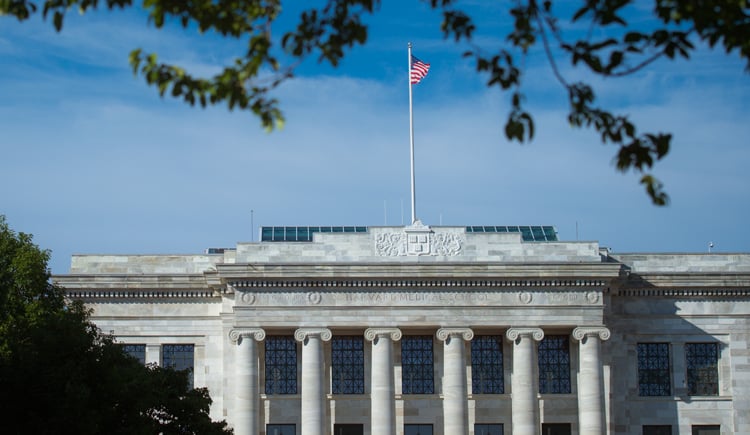I've had coffee now and in the interest of being more helpful I think that asking yourself "How can I get into Harvard?" is the wrong question and it's just going to stress you out. A slightly better question is "How can I make myself an appealing candidate such that Harvard will want to recruit me?" and an even better question is "What do I want out of my life and career and how do I prepare myself to achieve those goals?"
The best possible thing that can happen to you in college (or anytime, but college is a pretty natural place for it to happen) is to realize that what you really want out of your career and life is not necessarily advanced by doing the hardest possible thing (like getting into HMS) or having to play into some elaborate rat race or by going into medicine at all even. There are no one-dimensional or easy answers to these questions. I'll try to briefly give my own perspective about this. That said, always try to follow your gut instincts and dont be afraid to try your own path you know will work better for you.
1. figure out what you're passionate about
on a purely practical level, applications to anything academic, maybe even especially medicine, are always helped by articulating a clear vision and demonstrating evidence of acting on that vision, i.e. having an angle. Read my longer post about communicating your narrative in the med school app process here:
so on both sdn and reddit one piece of generic advice that you will often hear is some version of "make sure you have a strong narrative!". What does that even mean? I think that is a legitimate question and there probably is not a single answer to it. Here I will walk-through how I tackled this...

forums.studentdoctor.net
In order to articulate a vision you must first have one. What kind of doctor do you want to be? This is a very hard question, especially for a pre-med because so much of medicine is still locked behind the ivory tower of medical education and may be even more obscure depending on what institution you are coming from, your family background in medicine, etc. However, you don't have to answer the harder parts of this question just yet like "GI vs. Cardiology" or "Primary care vs. Specialize" or even "Medicine vs. Surgery". What kind of doctor would you admire? Surely there are people in life you admire, alive or passed. What makes them admirable? Read their biographies if they have them and find out about their lives. If they are alive and nearby, consider taking them on as mentors. Read some online guides about mentorship and getting the most out of mentoring relationships. Show interest and try out new things to explore what gets you excited about working, life. You may discover what brings you the most joy is hanging out with your friends and traveling; trust me when I tell you that you don't need to go to HMS to land a career in medicine that will let you hang out with your loved ones and travel a lot. Work is one dimension of life.
2. build a network, leverage it
The main benefit of going to a place like Harvard or its peer institutions is the network. It's the reason rich people are very cavalier about spending 40k a year on elite private education K-12 to maximize their progeny's chance of landing at HYMS and Co. in addition to bankrolling the 50-80k a year it will cost in tuition once they get there. That said, there is a big, big world beyond academic Olympus and lots of passionate, interesting, and hard-working people in it who might be invested in seeing you succeed.
How do you build your network? Business people have written reams about it so I'd start there. But for premeds my short advice would be:
a. go to conferences
b. if you are working in a department on research (and you should be at some point to at least try it out whether its in Public Health, Sociology, Molecular Biology, Social Work, or Theoretical Physics) then the head of the department should know your face and name.
c. Important people in the admin of your institution should also know who you are but please dont cold-email the University president. Easy way to do this is to be involved in student government; harder ways are to start initiatives and lead projects at your Uni and community. This is how you find rare opportunities for broad-scale leadership at your university and to make a bigger impact; it's also how you end up getting nominated for prestigious awards and scholarships. You have to work yourself up the ladder vertically and horizontally. Impress the head of your department and you might get to meet the Dean of your college at the Uni one day. Lead a very successful event or fundraiser and the people who fundraise for the university professionally WILL notice and will want to talk to you.
d. Always remember faces and names. I'm terrible at this, but it's a real skill that is worth developing.
e. Work to build other peoples networks! Connect people who you think should know eachother or are trying to work in a similar space. People appreciate this and will pay it back. This is also a good way to make friends, in general.
3. Do well in school.
It's very easy to make school your side-hustle during UG because there are just so many other things to do. My freshman English professor put it very nicely: "You have the rest of your life to do things that are considered extracurricular now, but you only have one time in your life to become an excellent student." The ability to learn how to learn is worth its weight in gold and University education is still pretty good at achieving that IMO but it requires a lot of effort and engagement on the part of the student, it is not an automatic byproduct of being enrolled at a university (nor is a university the only place to learn this skill).
As a premed, remember that school is your
main hustle. Everything else takes second place to being an excellent student. If you need to take time off after UG to build up your CV for med school that is totally OK, but remember that building up ECs and experience is much easier and cheaper than repairing a poor GPA/MCAT score. I focused on school for most of UG and 2-3 EC involvements, and only 1 of those ECs would be considered "exceptional" on its own. I then took 2 years to build my CV to a place where it would be competitive at the kind of med school I was aiming for and it worked out.
p.s.
Maintaining drive and passion is an endless struggle and it doesn't come easy for anyone. You don't want passion that comes easily because it will leave easily. You want passion tempered by a healthy dose of doubt. Don't forget to have lots of fun in college either. College is a good time.





